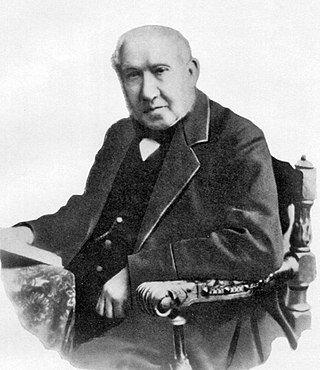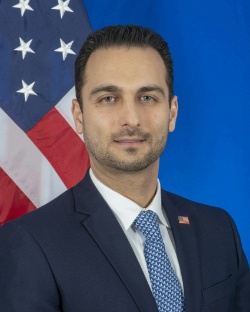
Maritime transport or more generally waterborne transport, is the transport of people (passengers) or goods (cargo) via waterways. Freight transport by sea has been widely used throughout recorded history. The advent of aviation has diminished the importance of sea travel for passengers, though it is still popular for short trips and pleasure cruises. Transport by water is cheaper than transport by air or ground, but significantly slower for longer distances. Maritime transport accounts for roughly 80% of international trade, according to UNCTAD in 2020.

The Merchant Marine Act of 1920 is a United States federal statute that provides for the promotion and maintenance of the American merchant marine. Among other purposes, the law regulates maritime commerce in U.S. waters and between U.S. ports. Section 27 of the Merchant Marine Act is known as the Jones Act and deals with cabotage. It requires that all goods transported by water between U.S. ports be carried on ships that have been constructed in the United States and that fly the U.S. flag, are owned by U.S. citizens, and are crewed by U.S. citizens and U.S. permanent residents. The act was introduced by Senator Wesley Jones. The law also defines certain seaman's rights.

Bayes Business School, formerly known as Cass Business School, is the business school of the City, University of London, located in St Luke's, just to the north of the City of London. It was established in 1966, and it is consistently ranked as one of the leading business schools in the United Kingdom.

Argus is an independent provider of price information, consultancy services, conferences, market data and business intelligence for the global petroleum, natural gas, electricity, emissions, biofuels, biomass, LPG, metals, chemicals, fertilizers, agriculture and coal industries.
Daily Cargo News (DCN) is a monthly Australian shipping, trade, transport and logistics focused magazine, published by Daily Cargo News Pty Ltd. First published in 1891 as Daily Commercial News, Daily Cargo News is Australia's longest running national newspaper.

Shin'yō Maru was a cargo steamship that was built in 1894, had a fifty-year career under successive British, Australian, Chinese and Greek owners, was captured by Japan in the Second World War, and sunk by a United States Navy submarine in 1944.

Atlas Maritime is an international shipping company with a fleet of tanker vessels engaged in the worldwide transportation of crude oil and refined oil products.
Journal of Commerce is a biweekly magazine published in the United States that focuses on global trade topics. First published in 1827 in New York, it has a circulation of approximately 15,000. It provides editorial content to manage day-to-day international logistics and shipping needs, covering the areas of cargo and freight transportation, export and import, global transport logistics and trade, international supply chain management and US Customs regulations.

CSAV is a Chilean shipping company that is currently the largest company of its type in Latin America and also one of the oldest ones, having been founded in 1872.

Greece is a maritime nation by tradition, as shipping is arguably the oldest form of occupation of the Greeks and has been a key element of Greek economic activity since ancient times. Today, shipping is the country's most important industry worth $21.9 billion in 2018. If related businesses are added, the figure jumps to $23.7 billion, employs about 392,000 people, and shipping receipts are about 1/3 of the nation's trade deficit. In 2018, the Greek Merchant Navy controlled the world's largest merchant fleet, in terms of tonnage, with a total DWT of 834,649,089 tons and a fleet of 5,626 Greek-owned vessels, according to Lloyd's List. Greece is also ranked in the top for all kinds of ships, including first for tankers and bulk carriers.
Sea transport systems in today's shipping market have evolved into three separate but closely connected segments: bulk shipping, liner shipping and specialized shipping. Although these segments belong to the same industry, each carries out different tasks and has a very different character.
The international shipping industry can be divided into four closely related shipping markets, each trading in a different commodity: the freight market, the sale and purchase market, the newbuilding market and the demolition market. These four markets are linked by cash flow and push the market traders in the direction they want.

Edward Boustead (1800–1888) was an English businessman and philanthropist, who founded Boustead & Co and played an active role in the development of Singapore as a business and trading centre. Boustead was born in Yorkshire, England. He was the great-grandfather of actor David Niven.
A shipping agency, shipping agent, or ship agency is the term used to refer to the appointed companies that handle operational and procedural (legal) requirements for a commercial vessel's call at a port for the purposes of cargo handling (loading/discharging), emergency calls, repairs, crew changes, or ship demolition, and protect the general interests of their principals on behalf of ship owners, disponent owners, or charterers in an objective manner.

Valemax ships are a fleet of very large ore carriers (VLOC) owned or chartered by the Brazilian mining company Vale S.A. to carry iron ore from Brazil to European and Asian ports. With a capacity ranging from 380,000 to 400,000 tons deadweight, the vessels meet the Chinamax standard of ship measurements for limits on draft and beam. Valemax ships are the largest bulk carriers ever constructed, when measuring deadweight tonnage or length overall, and are amongst the longest ships of any type currently in service.

The Review of Maritime Transport (RMT) an annual publication by the United Nations Conference on Trade and Development (UNCTAD). It provides an analysis of structural and cyclical changes affecting seaborne trade, ports and shipping, as well as an extensive collection of statistical information

Clarkson PLC, often referred to simply as Clarksons, is a provider of shipping services, and is headquartered in London. In 2011, Lloyd's List described the company's shipbroking service as the "undisputed heavyweight of the shipbroking market". It is listed on the London Stock Exchange and is a constituent of the FTSE 250 Index.
Harald Bernard Malmgren is a scholar, ambassador, and international negotiator who has been senior aide to US Presidents John F. Kennedy, Lyndon B. Johnson, Richard Nixon, and Gerald Ford, and to US Senators Abraham A. Ribicoff and Russell B. Long, United States Senate Committee on Finance. He has acted as an advisor to many foreign leaders and CEOs of financial institutions and corporate businesses and has been a frequent author of articles and papers on global economic, political, and security affairs.

Foremost Group is a privately held American shipping company, headquartered in New York City. It operates globally, chartering vessels to companies in the dry bulk shipping industry. Its clients include Bunge, Cargill, Dreyfus (Rotterdam), MOL (Tokyo) and NYK Line (Tokyo). Foremost Group was founded in 1964 by James Si-Cheng Chao and his wife Ruth Mulan Chu Chao, who each immigrated to the United States from China by way of Taiwan. Its chair and CEO since 2008 is Angela Chao, the sixth daughter of the company's founders and the third of their children born in the United States.

David Peyman is an American attorney. He served as Deputy Special Envoy to Combat Antisemitism for BDS, Eurasia & Special Projects in the United States Department of State, and from August 1, 2018 to April 5, 2020 he was the Deputy Assistant Secretary of State for Counter Threat Finance and Sanctions in the Bureau of Economic and Business Affairs. In this role, Peyman led the Office of Economic Sanctions Policy and Implementation and the Office of Threat Finance Countermeasures. Peyman currently serves as Of Counsel to the law firm DLA Piper where he advises clients on sanctions, AML, and FCPA compliance, digital currency and blockchain technologies, maritime compliance, CFIUS matters, and securing critical mineral and metals supply chains.













